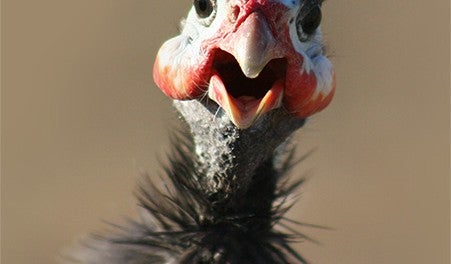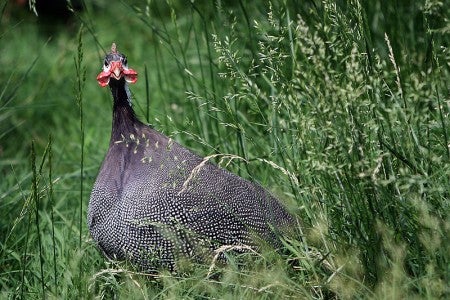The Glory of Guinea Fowl on the Farm

One of the more divisive issues on the farm is whether or not to incorporate guinea fowl. The truth is, people either love them or hate them and take a firm stance on their chosen side. Guineas are known for being obnoxious creatures that don’t have a whole lot of activity taking place inside their tiny heads, but this is no reason to dismiss them as unwelcome on your farm for they have plenty of good traits to boast.
First and foremost, a guinea is the best watchdog you will ever have. While Rover sleeps in the shade, you can rest assured the guineas will be on the lookout for anything amiss. Should something not sit right with them, whether it is a car pulling up or an aerial predator overhead, the guineas will vocalize their concern in a way few are able to miss. Then, when your guineas raise the alert, other animals will learn to respond, taking cover from threats right along with them.
Guineas make for excellent pest control. A tick problem is no match for a flock of guineas. Though chickens will also eat ticks, guineas have more of a reckless sense of abandon when it comes to foraging, being willing to leave no stone unturned in the quest for a tasty insect. Though ticks are what they are most well-known for eating, it doesn’t stop there; bug such as ants, earwigs, and beetles are on the menu as well. Additionally, guineas are not fans of snakes. If you have a snake problem, guineas can help eradicate it by killing small snakes and alerting you to big ones.
Since guineas are such voracious foragers, they tend to go pretty easy on the feed bill. In the warm months when bugs are plentiful, guineas will rarely make a stop at the food bowl, preferring nature’s bounty instead. Speaking of eating, guineas make a delicious meal. The birds themselves taste a lot like chicken although they can be slightly gamey. The eggs laid by guineas are smaller and harder than that of a chicken but those taste great as well.
The overall health of guineas also tends to be better than that of chickens. They dust bathe frequently which helps prevent mites and lice and are generally known to rarely become ill. The birds themselves winter well, being extremely tolerant of cold weather. They can be housed in the same type of environment as chickens and eat the same feed, so adding a few to your flock shouldn’t be much of a challenge to your farm or workload.
Though guinea fowl has so much to offer, the decision to acquire such birds does often come back to tick control. With diseases such as Lyme’s, the Heartland Virus, Powassan Virus, and other tick borne illnesses becoming more and more prevalent, adding guineas to your farm is an invaluable way to strengthen your defenses. Remember it is possible for not only humans but also other farm animals to contract such disease, so adding a funny-looking, loud flock of birds to your farm could be the best protective investment you ever make.







 Your Privacy Choices
Your Privacy Choices
Leave a comment